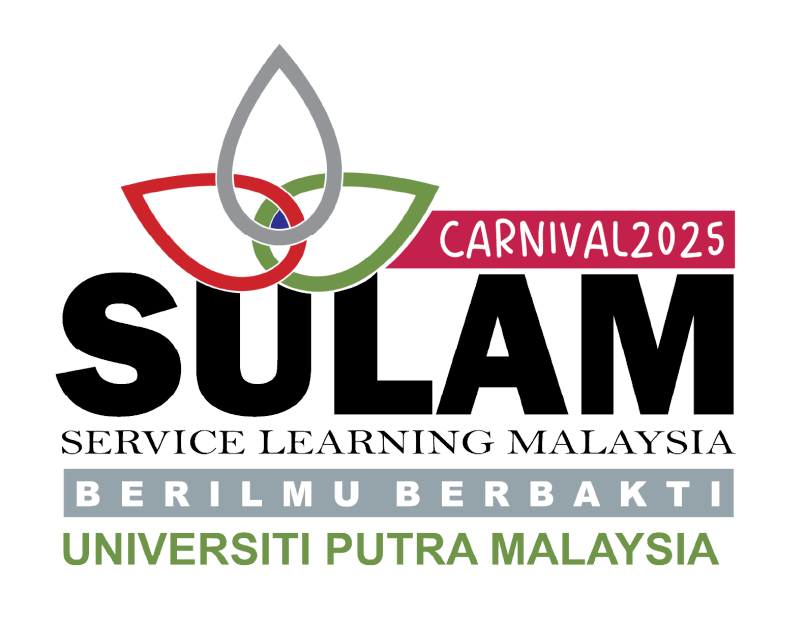
SULAM@UPM Carnival 2025

SULAM@UPM Carnival 2025
Dewan Besar Pusat Kebudayaan dan Kesenian Sultan Salahuddin Abdul Aziz Shah (PKKSSAAS), UPM
The organisation of the SULAM@UPM Carnival aims to highlight best practices in the implementation of SULAM across Higher Education Institutions (HEIs) in Malaysia, as well as to enhance awareness, understanding and appreciation of service-learning as one of the High-Impact Educational Practices (HIEPs).
The Service-Learning (SULAM@UPM) Carnival 2025 is scheduled to take place on 16-17 June 2025, bringing together participants from higher education institutions (HEIs) across Malaysia. This carnival aims to strengthen the High-Impact Educational Practices (HIEPs) approach by integrating academic teaching with community service, aligning with efforts to position HEIs as significant agents of social change.
SULAM, as one of the key strategies of the Department of Higher Education (JPT), emphasises active student engagement in solving community issues using the knowledge and skills acquired through the curriculum. This carnival will serve as a platform to highlight the impact of SULAM projects in supporting the Sustainable Development Goals (SDGs) and fostering holistic community development.
Encouraging and recognising the implementation of SULAM with communities, involving students and lecturers from HEIs alongside public participation, non-governmental organisations (NGOs), industries and relevant agencies in a more structured manner.
Showcasing best practices, innovative approaches, and high-impact service-based initiatives that contribute to the community, addressing the evolving needs of 21st-century learners.
Providing a platform to explore new approaches and discuss the latest developments in the field by bringing together educators, researchers, industry players and relevant agencies.
Highlighting the impact of SULAM on community well-being while promoting student and university involvement in addressing real societal challenges and fostering collaboration between universities, communities and industries to enhance the implementation of SULAM.

SULAM Project Competition
Pecha Kucha SULAM
SULAM Concept Project Competition
Special Award for SULAM Project
Each entry is limited to a maximum of five (5) participants only.
SULAM Projects Poster Competition
| Academic Staff | RM 300 |
| Teachers | RM 250 |
| Students | RM 200 |
Workshop (Free for SULAM@UPM CARNIVAL Participants)
- RM 100
SULAM Projects Poster Competition
| Academic Staff | RM 350 |
| Teachers | RM 300 |
| Students | RM 250 |
| School Students | RM 150 |
| School Students (Virtual) | RM 50 |
Workshop (Free for SULAM@UPM CARNIVAL Participants)
- RM 100
SULAM Projects Poster Competition
| Academic Staff | USD 100 |
| Teachers | USD 80 |
| Students | USD 60 |
| Participants (Virtual) | USD 50 |
Normal Participants
| UPM | RM 50 |
| Non-UPM | RM 50 |
| International | USD 20 |
One package, two great events! Register now for 1 I-PICTL2025 + 1 SULAM@UPM CARNIVAL 2025 Poster Competitions, save up to RM100 and gain access to top-tier academic and community engagement experiences!

UPM
RM500
RM400
RM300

Non-UPM
RM600
RM500
RM400
RM200
RM100

International
USD 180
USD 140
USD 100
USD 100
The SULAM Project Competition is an exciting platform for educators and students to showcase their groundbreaking projects and research in service-learning and community engagement to a diverse audience of peers, educators and experts.
This competition is divided into three (3) categories:
This category focuses on high-impact SULAM projects that have been successfully implemented with the community, enhancing both community development and the teaching and learning experience during Academic Sessions 2023/2024 and 2024/2025.
This category emphasises proposed SULAM projects with the potential to create significant community impact and enhance the teaching and learning experience. The proposed project should be feasible and capable of addressing real community challenges.
This category recognizes SULAM projects that demonstrate measurable impact, such as knowledge and technology transfer, collaboration between students and lecturers and active participation from the public, NGOs, industries, and relevant agencies. The projects should also be sustainability-oriented and foster long-term benefits for the community.
8:30 a.m - 9:00 a.m.
9:00 a.m - 12:30 p.m.
10:30 a.m - 11:00 a.m.
12:30 p.m - 2:00 p.m.
7:30 a.m - 4:30 p.m.
9:00 a.m - 11:00 a.m.
11:00 a.m - 11:30 a.m.
11:30 a.m - 12:15 p.m.
12:15 p.m - 1:00 p.m.
1:00 p.m - 2:30 p.m.
2:30 p.m - 5:00 p.m.
9:00 a.m - 11:00 a.m.
11:00 a.m - 12:30 p.m.
12:30 p.m - 2:30 p.m.
2:30 p.m - 3:30 p.m.
3:30 p.m - 4:30 p.m.